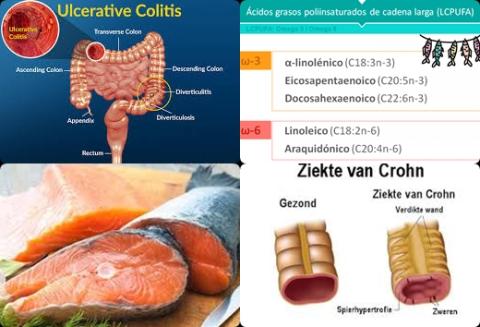
Objectives:
Fish consumption and dietary intake of n-3 polyunsaturated acids (PUFAs) may be associated with inflammatory bowel disease (IBD). Therefore, this review article has been conducted.
Is there an association between fish consumption or dietary intake of n-3 polyunsaturated acids (PUFAs) and inflammatory bowel disease risk?
Study design:
This review article included 5 prospective cohort studies and 7 case-control studies with a total sample size of 282,610 participants which 2,002 of them were cases of inflammatory bowel disease (1,061 Crohn's disease (CD) and 937 ulcerative colitis (UC)).
Results and conclusions:
The investigators found fish consumption significantly reduced risk of Crohn's disease with 46% [pooled effect size = 0.54, 95% CI = 0.31-0.96, p = 0.03].
The investigators found there was no relationship between total dietary n-3 PUFAs intake and inflammatory bowel disease risk [pooled effect size = 1.17, 95% CI = 0.80-1.72, p = 0.41].
The investigators found dietary long-chain n-3 PUFAs significantly reduced ulcerative colitis risk with 25% [pooled effect size = 0.75, 95% CI = 0.57-0.98, p = 0.03].
The investigators found no association between dietary α-linolenic acid (ALA) and inflammatory bowel disease risk [pooled effect size = 1.17, 95% CI = 0.63-2.17, p = 0.62].
The investigators concluded fish consumption reduces risk of Crohn's disease and dietary intake of long-chain n-3 PUFAs reduces risk of ulcerative colitis.
Original title:
Dietary intake of fish, n-3 polyunsaturated fatty acids, and risk of inflammatory bowel disease: a systematic review and meta-analysis of observational studies by Mozaffari H, Daneshzad E, […], Azadbakht L.
Link:
https://www.ncbi.nlm.nih.gov/pubmed/30680455
Additional information of El Mondo:
Find here more information/studies about fish consumption, n-3 PUFAs and chronic diseases.